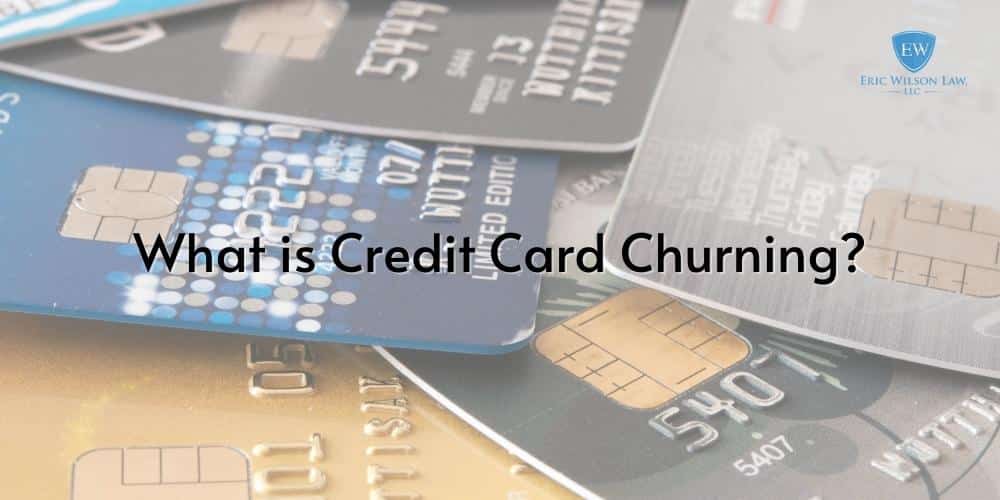Credit card churning is basically cheating the credit system. Through this strategy, you can potentially get credit card rewards like miles, points, and cash back. In a perfect world, free money has absolutely no downsides. But unfortunately, we live in an imperfect world where things like credit card churning can get you into major financial trouble. Below, the legal team at Eric Wilson Law discusses how churning credit cards can run up your credit card bill and damage your credit score.
If you’re drowning in debt, there is hope. Call Eric Wilson Law at 205-349-1280 to get your finances – and your life – back on track.
What is Credit Card Churning?
Credit card churning is when you open one or multiple credit cards in order to get various credit card rewards like travel rewards, bonus points, or cash back. This is how credit card churning works:
- First, you sign up for one or multiple new credit cards.
- Next, you meet the minimum spending requirements on these credit accounts in order to get the sign up bonuses.
- You cancel the credit card(s) (preferably before you have to pay the annual fee).
- You sign up for a new credit card with a different welcome bonus.
- Repeat the process.
With all the potential perks that come with churning credit cards, you may think this strategy is a no-brainer. Why don’t more people do this? Well, this credit card strategy doesn’t work for everyone. If you’re not responsible or organized when you churn credit cards, you could find yourself in some serious financial distress.
Is Credit Card Churning Illegal?
No, credit card churning is not illegal, but you can certainly get in trouble with many credit card issuers if you are caught doing this. Credit card churning activity can violate the terms and conditions of some credit card companies. As a result, your credit card issuer might punish you by closing your account and even confiscating (or canceling) your sign up bonus.
Pros and Cons of Credit Card Churning
You may be wondering: is credit card churning worth it? Just like anything else in this world, credit card churning comes with its own set of pros and cons. Before you start signing up for multiple cards in order to get the welcome bonuses, it’s important to understand exactly what you’re getting into.
Pros
The main benefits associated with credit card churning are just all the rewards points you can get, if you do it right of course. The main types of welcome bonuses include miles, points, and cash back.
Some cards allow you to earn a certain amount of airline miles for every dollar that you spend. Rewards points are basically just a different type of currency that you can eventually redeem for things like gift cards, merchandise, cash back, and more travel rewards. And lastly, cash back allows you to get a certain percentage of cash back on your credit card purchases.
Smart and organized credit card churners can save money and travel the world with their sign up bonuses. But one misstep can wreck your credit report and your credit score.
Cons
Some of the cons of credit card churning include:
- Credit card issuers can shut down your credit card accounts and confiscate your rewards if they catch you playing the system.
- You could end up spending more money in annual fees and interest charges than you receive in sign up bonuses.
- You could rack up thousands of dollars in credit card debt.
- Your credit score could suffer immensely.

Who Should Not Churn Credit Cards?
Some people can certainly afford to take the risks associated with credit card churning. Meanwhile, some people should not even attempt this strategy.
- If you have bad credit, you should not churn cards. Credit cards with the best welcome bonuses require applicants to have a credit score in the good to excellent range. Also, if you’re new to credit card churning (and you don’t have at least a good credit score), your credit score could go down even more.
- If you can’t afford the minimum spending requirements to earn rewards, you should not do credit card churning. You won’t get all these rewards immediately upon getting the credit card. You have to spend a certain amount of money to get these rewards. If you’re doing this for multiple credit cards, you’re going to end up spending lots of money. If you can’t afford to spend that much money, earning a few points or miles may not even be worth it, especially if you’re now drowning in debt.
- If you don’t have enough time or good organization skills, you should not churn cards. Churning credit cards requires both time and good organization. You have to keep up with fee schedules, credit card payments, and so much more. Additionally, keeping up with which credit card issuers have the best rewards takes time and research, because rewards can change on an annual basis. Basically, successful credit card churning can become a full time job, and if you’re not organized, you could face major financial consequences.
- If you’re planning to buy a house soon, do not do credit card churning. Basically, if you’re planning on taking out any sort of huge loan soon – whether that be an auto loan or mortgage loan – you should not be churning credit cards. Mortgage lenders in particular don’t like to see a recent credit history of opened and closed credit accounts. This can make you look like an unreliable and irresponsible borrower. Also, as previously stated, opening and closing accounts in quick succession can take a huge toll on your credit score. In order to qualify for a mortgage loan and to buy a house in general, you need to have a good credit score.
- If you have existing debt, you should not be churning credit cards. That’s because you’re going to struggle even more than you already are to keep up with your credit card payments. Do not put extra and unnecessary strain on yourself or your finances.
How Credit Card Churning Affects Your Credit
Possibly the biggest risk that comes with credit card churning is overall damage to your credit. There are multiple factors that make up a good credit score. Below, we discuss how churning credit cards can negatively impact all these aspects of credit.
Credit Utilization Ratio
Large percentages of credit scores (up to 30%) are made up by credit utilization ratio. This credit utilization ratio is basically the sum of your credit card balances divided by the sum of your credit card limits. The lower your credit utilization ratio, the better your credit score will be.
So if you have multiple credit cards, you will probably have a high credit limit. If you also have high balances of many of these cards, you will probably have a high credit utilization ratio (or you will at least be at risk for having a high ratio).
Length of Credit History
Average credit age and credit history also plays a huge role in credit scores. Most of the time, it’s best to keep all the cards you don’t want to use anymore in the back of a drawer instead of closing credit cards altogether. When you stow away unwanted credit cards, you’re still keeping the credit history. The longer you have a credit line open, the more reliable you look as a borrower.
The Number of New Credit Accounts
Credit card churning requires you to get multiple new credit cards in a short amount of time. If a lender or a credit card issuer sees that you have done multiple credit card applications in the span of 6 months to a year, they will think that you’re an unreliable and/or irresponsible borrower. This can bring down your credit score.
So if you just applied for one or more credit cards, you should wait at least another 6 months before you submit another application.
Credit Card Payment History
The biggest credit score determinant of all is timely payments. If your credit report is full of late or missed payments, your credit score is definitely going to suffer. Making timely payments is sometimes hard enough with just a few cards. It’s even harder when you’re constantly cycling through a ton of different cards on an annual basis. Failing to keep up with constant payments is how many credit card churners suffer in the long-run.
Banks and Credit Card Churning
Credit card churning may be legal, but that doesn’t mean that it’s not heavily discouraged by banks and credit card issuers. In fact, many banks have created strict rules to hopefully deter credit card churners.
- American Express: AmEx only offers only one large welcome bonus per person, per lifetime. In other words, you cannot sign up for an AmEx card, get the rewards, cancel the card, sign up again later, and get the rewards again.
- Bank of America operates under something called the 2/3/4 rule. This means that you can only get approved for two credit cards per two months, three cards per year, and four cards per two years.
- Chase has a 5/24 rule. Basically, if you’ve gotten more than five personal cards in the last two years (AKA 24 months) from any credit card issuer, then you can’t get a new Chase credit card.
- Citibank: Most Citi cards operate under a three year (48 month) rule. This means that you can’t get a credit card and earn its rewards for three years after your first Citi credit card application.

Call a Tuscaloosa Bankruptcy Lawyer at Eric Wilson Law Today
If you have crippling credit card debt from churning credit cards or just various life tragedies, the legal team at Eric Wilson Law can help. We offer top-notch financial help without judgment. We can carefully analyze your financial situation and help you determine if filing for bankruptcy is the best option for you. Call 205-349-1280 to schedule a free consultation today.


